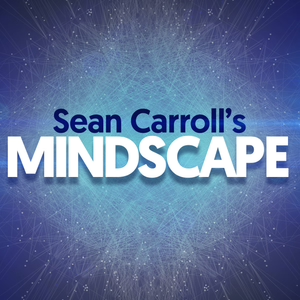
130 | Frank Wilczek on the Present and Future of Fundamental Physics
01/18/21 • 76 min
1 Listener
What is the world made of? How does it behave? These questions, aimed at the most basic level of reality, are the subject of fundamental physics. What counts as fundamental is somewhat contestable, but it includes our best understanding of matter and energy, space and time, and dynamical laws, as well as complex emergent structures and the sweep of the cosmos. Few people are better positioned to talk about fundamental physics than Frank Wilczek, a Nobel Laureate who has made significant contributions to our understanding of the strong interactions, dark matter, black holes, and condensed matter, as well as proposing the existence of time crystals. We talk about what we currently know about fundamental physics, but also the directions in which it is heading, for better and for worse.
Support Mindscape on Patreon.
Frank Wilczek received his Ph.D. in physics from Princeton University. He is currently the Herman Feshbach professor of physics at the MIT; Founding Director of the T. D. Lee Institute and Chief Scientist at Wilczek Quantum Center, Shanghai Jiao Tong University; Distinguished Professor at Arizona State University; and Professor at Stockholm University. Among his numerous awards are the MacArthur Fellowship, the Nobel Prize in Physics (2004, for asymptotic freedom), membership in the National Academy of Sciences and the American Academy of Arts and Sciences. He is the author of numerous books, most recently Fundamentals: Ten Keys to Reality.
- Web site
- MIT web page
- Google Scholar publications
- Nobel biography
- Profile in Quanta magazine
- Wikipedia
See Privacy Policy at https://art19.com/privacy and California Privacy Notice at https://art19.com/privacy#do-not-sell-my-info.
What is the world made of? How does it behave? These questions, aimed at the most basic level of reality, are the subject of fundamental physics. What counts as fundamental is somewhat contestable, but it includes our best understanding of matter and energy, space and time, and dynamical laws, as well as complex emergent structures and the sweep of the cosmos. Few people are better positioned to talk about fundamental physics than Frank Wilczek, a Nobel Laureate who has made significant contributions to our understanding of the strong interactions, dark matter, black holes, and condensed matter, as well as proposing the existence of time crystals. We talk about what we currently know about fundamental physics, but also the directions in which it is heading, for better and for worse.
Support Mindscape on Patreon.
Frank Wilczek received his Ph.D. in physics from Princeton University. He is currently the Herman Feshbach professor of physics at the MIT; Founding Director of the T. D. Lee Institute and Chief Scientist at Wilczek Quantum Center, Shanghai Jiao Tong University; Distinguished Professor at Arizona State University; and Professor at Stockholm University. Among his numerous awards are the MacArthur Fellowship, the Nobel Prize in Physics (2004, for asymptotic freedom), membership in the National Academy of Sciences and the American Academy of Arts and Sciences. He is the author of numerous books, most recently Fundamentals: Ten Keys to Reality.
- Web site
- MIT web page
- Google Scholar publications
- Nobel biography
- Profile in Quanta magazine
- Wikipedia
See Privacy Policy at https://art19.com/privacy and California Privacy Notice at https://art19.com/privacy#do-not-sell-my-info.
Previous Episode

129 | Solo: Democracy in America
The first full week of 2021 has been action-packed for those of us in the United States of America, for reasons you’re probably aware of, including a riotous mob storming the US Capitol. The situation has spurred me to take the unusual step of doing a solo podcast in response to current events. But never fear, I’m not actually trying to analyze current events for their own sakes. Rather, I’m using them as a jumping-off point for a more general discussion of how democracy is supposed to work and how we can make it better. We’ve talked about related topics recently with Cornel West and David Stasavage, but there are things I wanted to say in my own voice that fit well here. Politics is important everywhere, and it’s a crucial responsibility for those of us who live in societies that aspire to be participatory and democratic. We have to think these things through, and that’s what this podcast is all about.
Support Mindscape on Patreon.
Apologies to Alexis de Toqueville, who wrote an important book whose name I stole, and who is mentioned nowhere in this episode.
See Privacy Policy at https://art19.com/privacy and California Privacy Notice at https://art19.com/privacy#do-not-sell-my-info.
Next Episode

131 | Avi Loeb on Taking Aliens Seriously
The possible existence of technologically advanced extraterrestrial civilizations — not just alien microbes, but cultures as advanced (or much more) than our own — is one of the most provocative questions in modern science. So provocative that it’s difficult to talk about the idea in a rational, dispassionate way; there are those who loudly insist that the probability of advanced alien cultures existing is essentially one, even without direct evidence, and others are so exhausted by overblown claims in popular media that they want to squelch any such talk. Astronomer Avi Loeb thinks we should be taking this possibility seriously, so much so that he suggested that the recent interstellar interloper `Oumuamua might be a spaceship built by aliens. That got him in a lot of trouble. We talk about the trouble, about `Oumuamua, and the attitude scientists should take toward provocative ideas.
Support Mindscape on Patreon.
Abraham (Avi) Loeb received his Ph.D. in plasma physics from the Hebrew University of Jerusalem. He is currently the Frank B. Baird Jr. professor of science at Harvard University. He served as the Chair of Harvard’s Astronomy department from 2011-2020. He is Director of the Institute for Theory and Computation of the Harvard-Smithsonian Center for Astrophysics, and Founding Director of Harvard’s Black Hole Initiative. He is chair of the Advisory Committee for the Breakthrough Starshot Initiative. His new book is Extraterrestrial: The First Sign of Intelligent Life Beyond Earth.
See Privacy Policy at https://art19.com/privacy and California Privacy Notice at https://art19.com/privacy#do-not-sell-my-info.
If you like this episode you’ll love
Episode Comments
Featured in these lists
Generate a badge
Get a badge for your website that links back to this episode
<a href="https://goodpods.com/podcasts/sean-carrolls-mindscape-science-society-philosophy-culture-arts-and-id-210/130-frank-wilczek-on-the-present-and-future-of-fundamental-physics-12451989"> <img src="https://storage.googleapis.com/goodpods-images-bucket/badges/generic-badge-1.svg" alt="listen to 130 | frank wilczek on the present and future of fundamental physics on goodpods" style="width: 225px" /> </a>
Copy



